My BLGs September selection was Robert Liparulo’s mind bending supernatural thriller, The 13th Tribe, a story replete with suspense, thrills, weaponry, spiritual depth and a few immortals!
I’ve really enjoyed Bob’s thrillers and I knew my book club loves to challenge their regular reading habits so I was keen to share this one with them. The book gave us plenty to discuss, ponder and wrestle with!
Bob, being the great guy he is, agreed to be questioned by a group of women and I’m thrilled to share his responses with you. Enjoy Part 1 of our interview and be looking for Part 2 soon.
**Please be aware there are spoilers below**
The 13th Tribe
When a group of immortal vigilantes threatens millions, only one man is brave enough to stand in their way.
Their story didn’t start this year…or even this millennium.
It began when Moses was on Mt. Sinai. Tired of waiting on the One True God, the twelve tribes of Israel began worshipping a golden calf through pagan revelry. Many received immediate death for their idolatry, but 40 were handed a far worse punishment—endless life on earth with no chance to see the face of God.
This group of immortals became the 13th Tribe, and they’ve been trying to earn their way into heaven ever since—by killing sinners. Though their logic is twisted, their brilliance is undeniable. Their wrath is unstoppable. And the technology they possess is beyond anything mere humans have ever seen.
Jagger Baird knows nothing about the Tribe when he’s hired as head of security for an archaeological dig on Mt. Sinai. The former Army Ranger is still reeling from an accident that claimed the life of his best friend, his arm, and his faith in God.
The Tribe is poised to execute their most ambitious attack ever and the lives of millions hang in the balance. When Jagger’s wife and son are caught in the crossfire, he’ll stop at nothing to save them. But how can one man stand against an entire tribe of immortals?
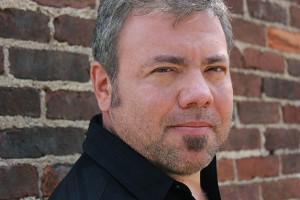 BLGs: There is a fascinating mix of history and science in The Thirteenth Tribe. What sort of research did you undertake for this book?
BLGs: There is a fascinating mix of history and science in The Thirteenth Tribe. What sort of research did you undertake for this book?
Bob: I travelled to many of the locations, read books and talked to experts about immortality, biology, theology, weapons (like flame throwers) high-tech military inventions (such as invisibility suits), relics, archaeology . . . I filled half a dozen thick binders with notes, maps, and photographs. I used to be an investigative journalist, so I tend to research a lot, and I have no qualms about asking the leading experts in their fields for interviews and throwing tough questions at them. I try to find the little gems that either stun readers or make everything in a scene feel just right.
I believe the only way to make such a wild concept as immortality palatable and entertaining to readers is to make everything else in the story as factual and real as possible. All the locations are real, and I hope detailed enough for readers to get a true feel for each place. And one way the immortals are traced through history is through actual art—such as the Spinario or Boy with Thorn and Jean Auguste Dominique Ingres’s Apotheosis of Homer. I did a lot of research into biblical events, such as what really happened at the gold calf, and studied extra-biblical stories, such as the Apostle John being tortured by putting him into a vat of boiling oil. Many of the historic events described—a Civil War massacre, Rasputin’s death— really happened.
A lot of times, science eventually “catches up” with God’s miracles and we can explain them in human terms—which doesn’t make them any less miraculous, but shows that God often uses the incredible things He created for us on earth to facilitate His will. I wanted that to be the case with the immortals, so I explain how every cell in the human body has telomerase genes—called immortal genes—which allow cells to replicate forever, which would result in the cessation of aging. Trouble is, they are “switched on” in only a few cells. I posit that God activated all the telomerase genes in the immortals, so there’s both a biological and a supernatural reason for their immortality.
What drew you to writing suspense rather than any other genre?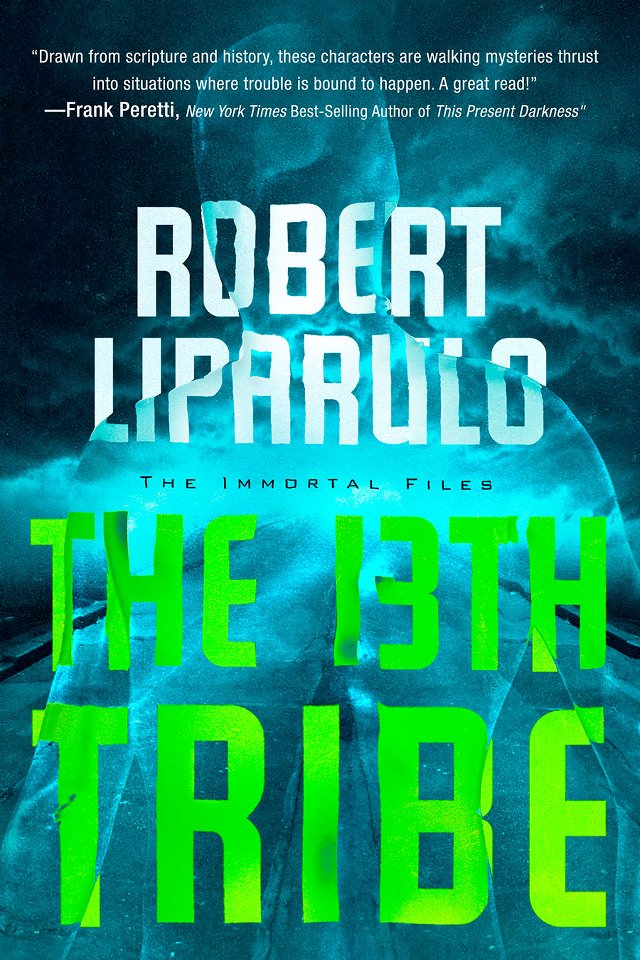
It’s what I’ve always read, and it incorporates things that interest me. Besides being an adrenaline junkie, I have a keen desire to know what makes people tick. Take the average Joe, someone who may never have been in a fistfight, who spends his days behind a desk and coaches little league; a guy who’s gone through his life believing in civility and the general goodness of people: How does he handle a life-or-death situation hurled at him by a murderous psychopath? What does it take for him to stand up for what’s right? Where does he find the strength? The skills?
I’ve always believed a person’s true character comes out when the heat’s on, when the wrong move leads not to an unemployment line or a brief visit to the ER, but to a cold, steel table at the morgue. At heart, is he (or she) a coward, or a hero? Is he so out of shape or witless about anything other than balance sheets or spark plugs that he couldn’t enter the arena even if he wanted to? Watching someone reach deep to find what he needs to survive, to save someone else—bravery, endurance, that part of his brain he hasn’t used in two decades—that’s interesting.
Are you a writer who plans your stories extensively, or do you begin with an idea and let the characters tell you what’s going to happen?
Somewhere in-between. I want my characters to lead me through a story. If I outline to extensively or too far ahead, then it’s me, as an author, who is forcing my characters to behave the way I would behave in those situations. When I create compelling characters and set them free, they develop what seems to be personalities and behaviors all their own. They start to do things I never would have dreamed they would. They respond differently from the way I thought they would when I thought through the story. But I do have certain points in the story that I know have to reach; I just prefer to let the characters tell me how to get there. Typically, I know about three days in advance which scenes are coming up. That helps me stay on track without being too overbearing on my characters. It’s the best of both worlds.
Did you always want to be an author or is it something you came to on your way to something else?
I knew I wanted to a writer—any kind of writer—since I was eight, and specifically a novelist since I was twelve. I’ve written short stories, celebrity profiles and interviews, screenplays, movie reviews, travel and business articles, even a printer manual . . . anything I could to keep writing avoid getting a “real” job.
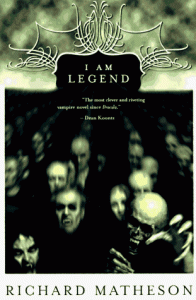 Looking at your website – you obviously love the thriller genre. What are your favourite movies/books/authors?
Looking at your website – you obviously love the thriller genre. What are your favourite movies/books/authors?
My favorite author is Richard Matheson (his I Am Legend is my favourite book). I also like Elmore Leonard, Dean Koontz, Thomas Perry, F. Paul Wilson, Tess Gerritsen, Michael Crichton, James Rollins, David Morrell, Steve Berry . . . it’s a long list. Some of my other favorite books are Koontz’s The Face, Perry’s Sleeping Dogs, as well Orson Scott Card’s Ender’s Game, Tolkien’s Lord of the Rings, James Dickey’s Deliverance, Neal Stephenson’s Snow Crash, and Umberto Eco’s The Name of the Rose. My favorite movie is Jaws, followed closely by Lord of the Rings, Heat, and Ronin.
In the “13th Tribe” it was scary to see how twisted the logic was within the “tribe”, how they justified their cold blooded killing – still trying to “pay” for their own sin. Was it always your intention for the character of Beth to reach one of the Tribe members?
Going into the story, I wanted one of the Immortals to find salvation, and I wanted Beth to have conversations with the Immortals—mostly to show put their way of thinking up against more logical, or proper, Biblical interpretations. I wanted to see the two sides contrasting with one another. But it wasn’t until I was well into the interactions between Beth and Ben than I realized one scene would lead to the other.
Do you know someone like Beth, who would find God in the midst of such pain and be able to minister to such as these?
My family has a dear friend who is similar to Beth in that way. I may have made Beth a bit more resilient—I’m not sure anyone would be quite as tolerant of the Tribe’s ways as Beth is, but this woman we know is close.
Jagger was a great character, a very tortured soul. His love for Beth and his own doubts seemed to have given him the motivation to leave his former life in the tribe. After the car accident, there were many hurdles between him and God. What do you think was the largest and most difficult to overcome?
Despite his anger at God for taking the lives of his best friend’s family, the anguish at losing his arm, and the guilt over surviving the crash, I think having the live with Beth and Tyler’s loyalty to God was actually the hardest thing to deal with—but it was also what he needed most to recover, to find his way back to God. When you’re crushed, you just want to wallow in your despair, to give into it at least for a while. Jagger couldn’t embrace his own pain as he wanted to because he had a family who not only depended on him, but who also loved the God Jagger wanted to hate. It’s the basis for something he has to deal with in the third Immortal Files book.
In some personality types there is a heavy sense of justice that can create a vigilante mentality – as Christians, how do you think we can deal with this both within ourselves and within our so-less-than-perfect world?
I really think the only way we can reconcile our need for justice with a world in which justice doesn’t always seem to prevail is to understand that God is in control. Somehow, someway, He will set things right. We may not see it in our lifetime, and it may not be the sort of justice we think is right, but God will always balance the books, even if it means offering grace to someone we don’t think deserves it. None of us do. We have to trust that God has everything covered.
In our “God is love” modern day Christianity sometimes we cannot relate to or reconcile the God who punished entire groups of people, including women and children, in the Old Testament. How would you explain this to a young adult/teen?
Again, I’d have to fall back on the idea that God’s ways are higher than ours. Our concept of what love is isn’t necessarily God’s idea of love. I think to God justice is love. He didn’t simply forgive us our sins; He offered His son to die for us, to pay for our sins. If you don’t accept that gift of someone else assuming the punishment for our sins, then you must pay for them yourself, and that can be devastating to behold. If God’s wrath wasn’t horrible—if the price of sin wasn’t death—then Christ’s sacrifice wouldn’t be as wonderful as it is, it wouldn’t be the huge act of love that it is.
Be sure to return to read Part 2 of our interview and learn about Bob’s weaponry research, who his first readers are, and more…Encourage Bob by leaving a comment, if you can!
Bio:
Former journalist Robert Liparulo is the best-selling author of the thrillers Comes a Horseman, Germ, Deadfall, Deadlock, and The 13th Tribe, as well as The Dreamhouse Kings, an action-adventure series for young adults. He contributed a short story to James Patterson’s Thriller, and an essay about Thomas Perry’s The Butcher’s Boy to Thrillers: 100 Must Reads, edited by David Morrell and Hank Wagner. He is currently working on the sequel to The 13th Tribe, as well writing an original screenplay with director Andrew Davis (The Fugitive).
When not writing, Liparulo loves to read, watch (and analyze) movies, scuba dive, swim, hike, and travel. He lives in Colorado with his wife Jodi and four children: Melanie, Matthew, Anthony, and Isabella.

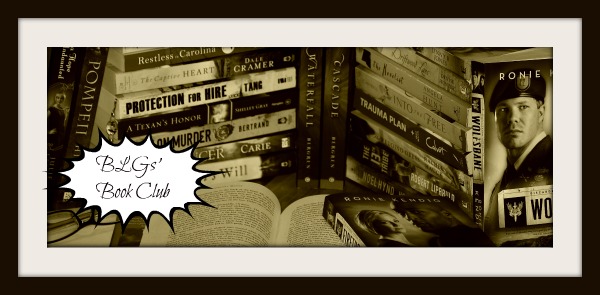
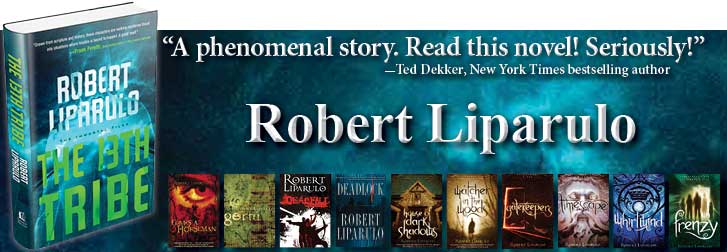

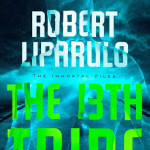






September 30, 2012 at 4:48 pm
Great interview Rel.
Good balance between understanding Bob’s process & inspiration as well as an insight into the characters and story.
This may have pushed the novel ahead of Dineen’s “Soul Saver” as my next read.
Looking forward to Part 2.
Ian
October 1, 2012 at 11:24 am
Ian » Bob has done a great job with his responses, hasn’t he? I’d love to hear your thoughts once you have read it!
October 1, 2012 at 12:58 am
FANTASTIC interview, as always, Rel. 13th Tribe is one of my favorite reads! Bob is brilliant in the way he weaves historically accurate elements into the story. LOVED that about the story. And I felt challenged by the story as well!
October 1, 2012 at 11:22 am
Ronie » Thanks, girl! Bob did all the hard work 🙂 It was an intense and intriguing read, for sure!
October 6, 2012 at 11:27 pm
Bob is the ultimate friend, an incredible thriller writer, the master of pacing, and he has an imagination that defies reality. Love him and his work.
October 7, 2012 at 10:52 pm
Nicole » Totally agree 🙂